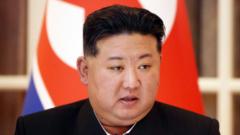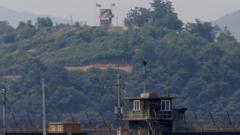South Korea's newly elected President Lee Jae-myung assumes office under significant pressure following the impeachment of his predecessor. With U.S. tariffs looming and North Korea's ambitions growing, Lee must act swiftly to secure his nation's economy and security while managing complex relations with China and the U.S.
New South Korean President Faces Immediate Challenges Amid U.S.-China Tensions

New South Korean President Faces Immediate Challenges Amid U.S.-China Tensions
Lee Jae-myung steps into office with urgent economic and political crises, demanding quick diplomatic navigation through challenges with Trump and North Korea.
Lee Jae-myung's unprecedented rise to the South Korean presidency was marked by a significant electoral victory, capturing nearly half of the votes amidst a backdrop of political turmoil. However, unlike typical incumbents, his transition to leadership is devoid of a grace period due to the impeachment of previous President Yoon Suk Yeol, who attempted to enforce martial law last December. Lee, representing a shift away from militaristic governance, has pledged to fortify democracy and promote national unity in a divided nation.
The newly appointed president, however, is immediately confronted by a crisis reminiscent of Donald Trump's past policies. As relations with the U.S. deteriorate, Trump’s recent implementation of a 25% tariff on South Korean goods is poised to destabilize an already faltering economy. Analysts deem these tariffs as potentially triggering an economic crisis, placing immense pressure on Lee's administration even before it fully settles.
With economic negotiations on hold due to the absence of a dedicated president, the stakes are high. The U.S. maintains military security in South Korea, primarily by stationing 28,500 troops on Korean soil as a deterrent against North Korean aggression. Yet, Trump’s rhetoric suggests a looming re-negotiation where financial contributions may dictate security commitments, leaving Seoul susceptible to economic and military coercion.
Under these circumstances, President Lee must deftly navigate his relationship with Trump, who has previously questioned the presence of U.S. troops. The changing dynamics of U.S. foreign policy, driven by the need to counter China's influence, add additional layers of complexity to Lee's position. The dual challenge of ensuring economic stability while simultaneously addressing military obligations to both the U.S. and regional alliances presents a daunting task.
The previous administration's erratic policies have left South Korea doubting the dependability of its American ally while also wary of entrapments in U.S.-China tensions. Lee’s rising skepticism towards the South Korean-U.S. alliance complicates his efforts to engage with China, which plays a pivotal role in South Korea's economic future and security landscape.
Trump's prior negotiations with North Korean leader Kim Jong-un yielded limited success, leading to fears that future discussions could sacrifice South Korean security for American interests. The prevalent concern is whether Trump might be swayed by North Korea’s desire for recognition as a legitimate nuclear state, potentially leading to dangerous compromises at the expense of South Korea's sovereignty.
Despite these overwhelming challenges, experts assert that prompt diplomatic engagement with the U.S. is critical for South Korea's survival and standing. Lee's government is thus encouraged to leverage its strengths, notably in shipbuilding—where it ranks just below China—to solidify its value as an ally in the geopolitical landscape.
Institutions like Hyundai Heavy Industries emphasize South Korea’s potential contributions to U.S. naval strength as crucial negotiating points. As the new president settles into office, the landscape is set for immediate action, with expectations that Lee Jae-myung will not only navigate his administration through crises but also emerge as a stabilizing figure amidst a tumultuous region.


















